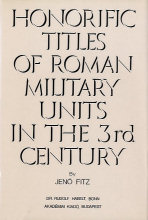
FITZ : Honorific titles of Roman military units in the 3rd century (fülszöveg)
The civil war of 193—197 A.D. considerably strengthened the imperial power of the Romans and, together with this, the influence of the legions on which this power was based. The close links between the emperor and the army were demonstrated by the regular granting of honorific titles to certain army units. This practice lasted from the reign of Caracalla to the period of Diocletian. In addition to its emphasizing that a unit belonged to the emperor, the epithet formed from the name of the emperor was also a manifestation of an individual unit's loyalty. These imperial epithets were different from those (Pius, Felix, Constans, etc.) awarded in honour of a unit's military achievements. Awards of honour could be confiscated only as a punishment, whereas imperial epithets were dropped when the emperor died.
The honorific titles have been interpreted in very different ways. According to the most widespread opinion, the epithet was automatically granted to all military formations on the emperor's accession. If this is true, no historical importance can be attributed to them: their sole use being an approximate means of dating inscriptions or indicating the period during which an emperor ruled. Another view is that an epithet was granted only to a particular unit or formation as recognition of a specific action or service. Comparison between inscriptions without an epithet but with identifiable date and those with an epithet within the period 212 to 300 which mention an army unit sheds new light on the practice followed in awarding these epithets, the reason for so doing. A valuable source is thus provided on the hitherto largely unexploited Roman military history of the 3rd century.